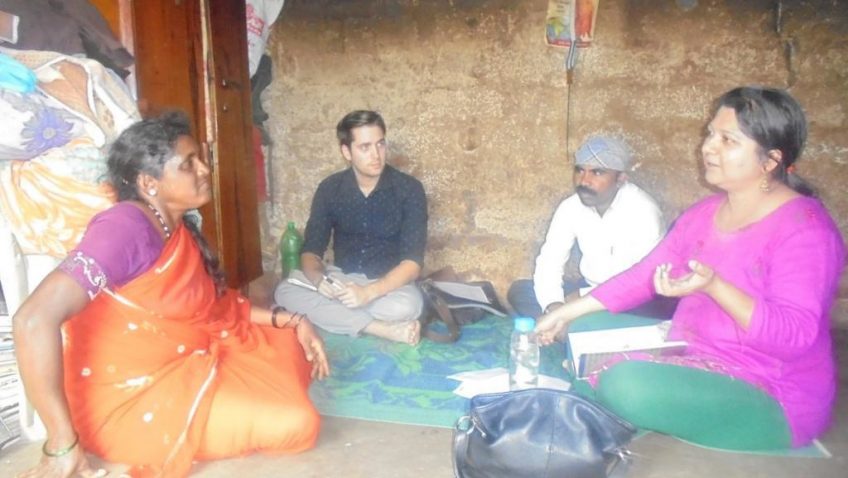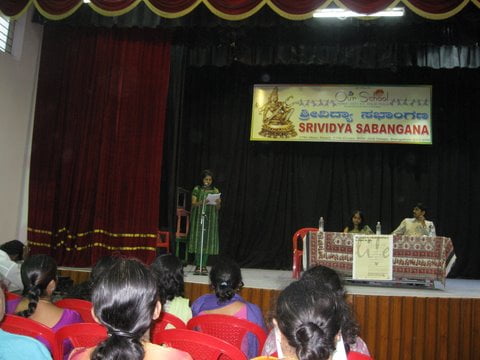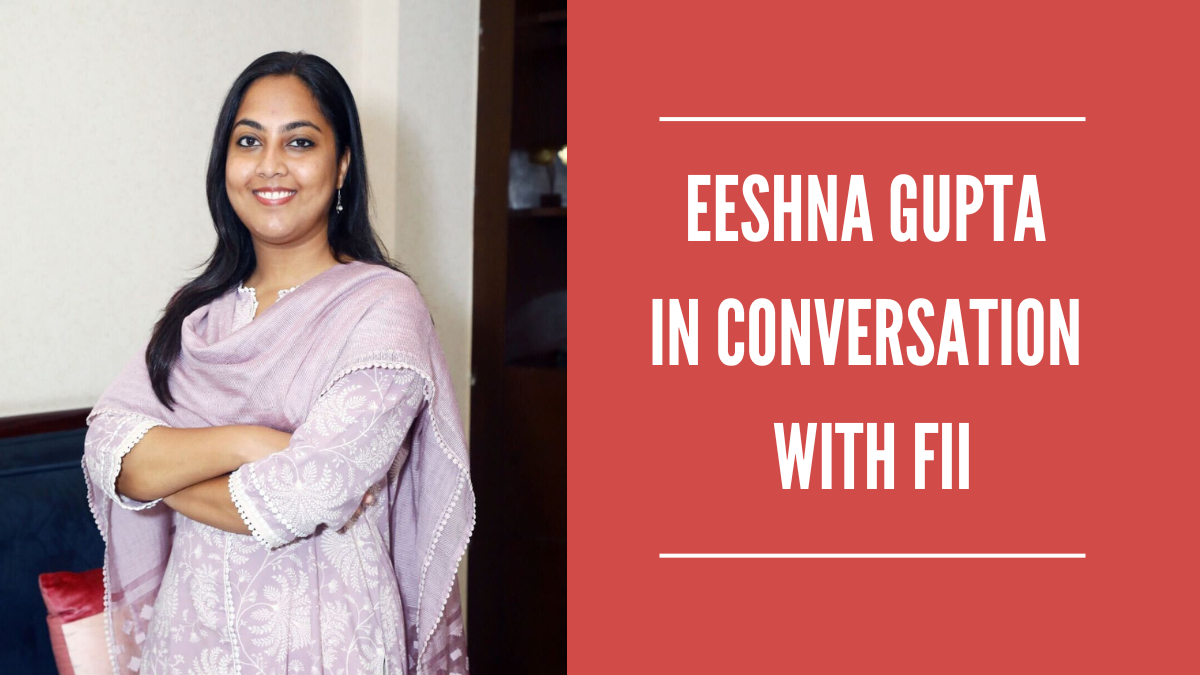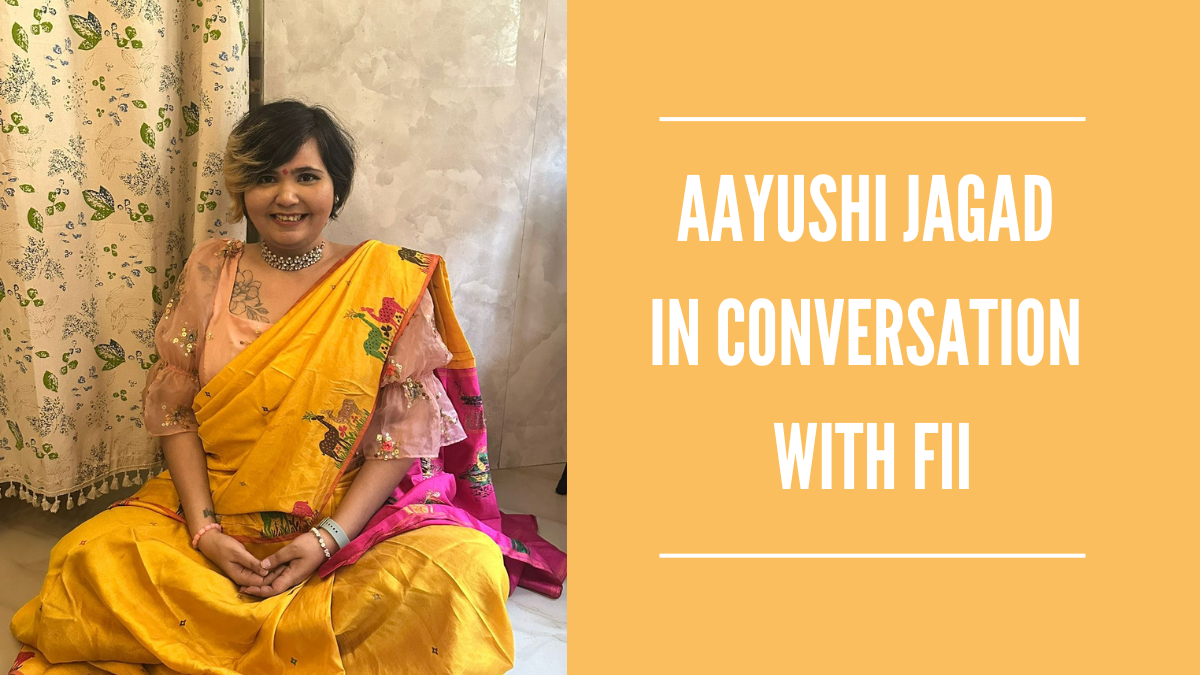Dr Lavanya Seshasayee is a women’s mental health specialist and the founder of the Global Women’s Recovery Movement (GWRM). She has had a distinguished academic career, having been a Fulbright finalist, a Bapu Trust fellow and a Movement for Global Mental Health Fellow.
A powerful self-advocate for women with psychosocial disabilities, she has focused on the realisation of the principles of the United Nations Convention on the Rights of Persons with Disabilities (UNCRPD). Her work with the GWRM has focused on feminist psychotherapy and on centering the experiences of user-survivors of the mental health system in the recovery process.
Vani Sharma: Tell us a little about your journey as a person with schizophrenia who is a PhD holder, a self-advocate for mental health issues and the founder of the GWRM.
Lavanya Seshasayee: I did a PhD at a point in time when my family thought I was better off getting married. I wanted to reach for the stars and prove to the world that I wasn’t dependent on a man. I did finish my PhD in Women’s Mental Health to be able to reach out to other women in distress. I had recovered completely by then owing to the major transformations I brought in my mother’s attitude towards me. She has become my strongest ally.
My mother had the courage to stand by me when nobody in the world believed in my dream of doing a PhD. After which, I married my lover who, I believe, is the best husband the world has ever seen and an equally strong ally. With the support he provided me in our marriage, even the last remnants of my illness disappeared never to return again.
Six months before my wedding, in 2009, I was the only funded scholar from India out of 9 distinguished scholars who were invited to participate in the Global Mental Health Summit in Greece. I have since toured the world and made presentations at several international conferences, workshops on mental health and non-psychiatric approaches to mental well-being. I have spoken at Kings College, London; the Global Mental Health Summit, Greece; Suicide Prevention, Australia; and the National University of Ireland, Galway, among many other places.
I pioneered the self-advocacy model in mental health in India, along with Dr Bhargavi Davar. This is somewhat like client-led and client-based therapy although not exactly the same. I also made some useful legal recommendations to the drafting committee during the time the New Mental Health Care Bill was propounded in India before it became a full-fledged act.
I wanted to start the GWRM when I realized I was short of funding. Then I reminded myself of my mother’s, and most importantly, my own dream of being a beacon of hope. I worked at various organizations and accrued just enough money to start the GWRM (formerly the Indian Women’s Recovery Movement) with my mother and my husband, who were very willing partners.
Our goal is to empower every woman on the planet with either the user-survivor model or a combination of the user-survivor model with only some beneficial aspects of the medical model. We believe in applying the articles of the UNCRPD, which are very pro-choice. This has been my path to living a full and passionate existence.
VM: You often speak of how gendered socialization during your upbringing shaped your disability. Would you feel comfortable telling us a little more about this?
LS: I was born into a traditional South Indian Brahmin family that laid down specific and separate codes of conduct for women and men. There was a societal double standard that implied that a boy could be as independent, assertive and ambitious as he wished to be, whereas a girl had to perform domestic chores and keep a beautiful figure that would enable her to bag a successful man for a husband.
Women were not expected to be very good at ‘masculine vocations’ like mathematics and engineering. They were expected to be vehicles for the transmission of familial culture to the next generation and find happiness via their traditional vocations as good wives and good mothers. When I attempted to gain the same acceptance for my achievements, I was told to “stick to my role” and “not talk too much”.
When I voiced my concerns about this double standard, I was made to undergo tremendous pain. There was tremendous pressure exerted on me to study and also perform these gender stereotyped roles. I wanted to prepare for the entrance for the Indian Institute of Technology which required me to put in 12 hours of effort daily and consistently for a period of five years.
I was beaten, punished psychologically and was stripped of my dignity by my own mother. She was motivated by my jealous aunt to make me work like a donkey on the pretext of “giving me a proper upbringing”. I was made to sign a bond saying “I will pay for all the food, boarding and lodging I receive in this house by performing all the domestic work in this house”.
My aunt claimed I needed “to be disciplined for my own good” and drew up a timetable to make sure I did all the work I was supposed to do as a girl every day. For the next two years, I was simply unable to study. I was talking incoherently in college sometimes without even being aware of it and became the laughing stock of all my classmates. However, there were other times when I performed excellent qualitative as well as quantitative analysis.
I still wasn’t able to study consistently on account of the torture meted out to me and I had nobody to complain to in such difficult times. My teachers at college concluded I was lazy and arrogant and treated me very badly. Injury upon injury was heaped on me. When I finally failed in a crucial examination at the end of two years, I approached the mental health set-up for help.
I was told by the traditional psychologists and psychiatrists, with their victim blaming propensity and incorrect models of counselling, that whatever had happened to me had happened because “I had allowed it to happen” to me. Nothing could be farther from the truth. They claimed I had faulty genes and that was what made me who I was.
This, of course, absolved them of all responsibility to change my pathological environment which would have been “too much of an effort” for them. It was far more convenient for them to say I was innately defective. This sort of an explanation would enable them to sedate me with a drug which for them was the easiest thing to do.
I considered myself to be a failure until I met Bhargavi Davar, who was a women’s rights activist. She was a feminist psychiatric survivor. She was the first woman to start a very well informed and responsible user-survivor network in India. She launched an anti-psychiatry movement in India which was one of the most humane and wonderful movements that have ever benefitted consumers, users and survivors of psychiatry.
She once told me, “the mental health system drugs consumers for hearing voices, but who will drug the mental health system for failing to hear the voices of consumers?” She was summarizing the whole truth in a very apt manner. I am very grateful to her and owe my recovery to her.
I had been made to believe by my relatives that the only option left for me was to become a wife and a mother and that I did not have the capacity to achieve anything in life. I took these statements so seriously that I truly believed I didn’t have a future which made me want to commit suicide. But when I met Bhargavi Davar, I understood that one did not necessarily need to get into the engineering or medical profession to be considered successful.
I learnt that I could defy the engineering-medicine stereotype by writing a revolutionary PhD thesis which added another dimension to my mental health activist friend’s work. My work enabled me to travel the world and even get interviewed on the BBC World Radio. The primary intention was, of course, to help those in distress. My relatives who had wronged me eventually saw me succeed, travel the world and get interviewed by international media which forced them to recognize my true potential and intelligence.

Image Credit: Indians News
VS: What are some of the gaps that psychiatric treatment has when dealing with women with psychosocial disabilities?
LS: There are several gaps in psychiatric treatment for women with psychosocial disabilities. Psychiatrists operate on the assumption that if a woman is having a mental health problem then it is because there is something in her own biological make-up that prevents her from having an amicable relationship with the people around her. The pathological social environment is never considered as contributing to the ‘mental illness’ or psychosocial disability or her ‘maladaptive behavior’, which in itself is an adaption to extreme environmental stress.
The UNCRPD, on the other hand, correctly conceptualizes the whole thing. Here the social, legal, cultural and attitudinal barriers are properly seen as factors that produce disability in an impaired individual. The solution would hence be to accommodate difference instead of pathologizing difference.
Also the discipline of psychiatry creates a situation where what is being taken away along with the client’s “illness” is the personhood of the client. The question that psychiatrists should be asking themselves is, “how do we take away the illness of the patient without taking away their personhood?”
This was a crucial question originally raised by the great philosopher Gadamer. There are quite a few women patients whose bodies are so objectified by psychiatry that they want to take psychiatric tablets and recover in order to be able to fight psychiatry. This is precisely the diabolism that the discipline of psychiatry creates.
Medical training itself needs to change, especially where psychiatry is concerned. Women who are victims of psychosocial disabilities should not merely be seen as masses of chemicals. They are human beings in need. They have emotions and feelings – which need to be conceptualized as part of medical training.
The psychiatric discipline also reinforces gender stereotypes and roles. A woman is often brought into the clinic with the complaint that she doesn’t cook or take care of children or perform her duties responsibly. But what the psychiatric system doesn’t understand is that this is her way of protesting against stereotypes being imposed on her.
Role rejection in itself may be the consequence of gender discrimination. But does psychiatry thereby see itself in a position to be able to re-socialize the men who cause their wives or mothers or daughters to suffer?
When women clients complain against patriarchal practices that are causing them immense stress, women professionals may have internalized patriarchal norms themselves and just see patriarchy as a ‘way of life’. A woman who complains of rape or sexual abuse may be asked what she did to provoke the man who abused her. The offender goes scot-free whereas the woman gets blamed.
The Freudian theory of penis envy is very unfair to women. Freud said that a woman, during the natural process of development, realizes she can never have a penis like a man. This is supposed to cause anger, envy, and hatred and in order to overcome this, she desires a son who can symbolically restore her lost penis.
That is why women want male children as per Freud. However it is the social validation of the birth of a male child, rather than penis envy, that makes a woman want to have sons rather than daughters.
Freud also says it is natural for the man to be sexually aggressive in male-female sexual relationships, thereby naturalizing sexual violence. True recovery can be facilitated only when psychiatric settings get rid of stereotypes such as these. Respect for the woman’s body will never be the norm if ideas like these prevail in the clinic.
Also Read: In Conversation With MINDs Foundation: Eliminating Stigma Around Mental Illness
VS: Do you think the psychiatric profession in India has improved in its treatment of persons with disabilities, particularly women with disabilities?
LS: They need to go a long way in terms of incorporating feminist and client empowering perspectives in the clinical repertoire. Currently they are not at all sensitive to the plight of women suffering from psychosocial disabilities. If there is a man with a psychosocial disability, the psychiatric profession advises the woman to be nice to him, to be a pativratha (loyal to her husband) and care for him and so on.
But let a woman have the same ‘mental illness’ and she will immediately be dispatched back to her parental family as per professional advice. Wrong road maps are also used during psychiatric counseling in this way. These road maps are not only wrong – they are patriarchal. This happens especially in rural areas, although psychiatrists in urban areas may be equally insensitive.
VS: What alternatives do you suggest to a medical model of looking at psychosocial disability?
LS: Feminist Self Advocacy (FSA) is a model I have evolved after having observed the lives of women suffering from psychosocial disabilities. FSA is holistic and doesn’t blame the victim but tells her she has a right to her anger. It allows for her to express her anger in a way that will enable social set ups to truly change for the better.
It also includes a livelihood component because empowerment can happen with the economic empowerment of women. When women are economically empowered, they gain better bargaining power in society and their words get validated. The respect and dignity she will be entitled to after this feed into a sense of well-being and security and makes recovery sustainable.
Thus, a positive feedback loop is created. The other good alternatives that could be combined with FSA are yoga, gardening, diary writing, hydration, nutrition, walking, running, aerobics, music therapy, talk therapy, meditation therapy, movement therapy, flower remedies, spirituality and so on. One or more of these alternatives could be combined with FSA either with or without medication being taken by the client, depending on what the clients are comfortable with.

Dr Lavanya Seshasayee commemorating the victims of Erwady Tragedy. Image Credit: Indians News
VS: When did you begin to identify as a feminist? How did this impact your identity as a person with a psychosocial disability?
LS: I began identifying as feminist from the age of 13, when my brother was given preferential treatment just because he was a boy. He not only created a horrible atmosphere in the house for me, but also left for the US in search of greener pastures whereas I was made to rot in the kitchen.
When my ambitions in life were systematically destroyed, I became prey to a psychosocial disability. It was because I was a feminist and dared to challenge gender stereotypes that I was made to develop a disability. My ambition at that time was to become a business tycoon, which was hardly understood by my mother. She thought a girl had no business being so ambitious. To start with, I had absolutely no psychosocial disability.
VS: Do you think mainstream feminism adequately considers the role of gendered socialization and violence in shaping mental and psychosocial disabilities?
LS: Mainstream feminism already does and it should do so even more. Feminism is a beautiful system of knowledge. What is more important is that feminism has always addressed the area of mental health. Sylvia Plath, Victoria Wolf and other feminists clearly implicated the role of gendered socialization and patriarchy in causing mental distress in women, especially through their writing. Now we know that men suffer just as much on account of patriarchal practices and beliefs.
VS: How can feminists play a greater role in engaging with issues of persons with psychosocial disabilities? What are the shortcomings of our present approach?
LS: The shortcomings of our present approach are that feminists themselves tend to be bandwagonists. Do they really practice what they say? Is the personal truly political? If they don’t do it themselves then how do they expect to be role models to the community? Another problem I see is that most feminists are white/upper caste, middle class and urban and so on. We need to have on-the-field programs that address the needs of women belonging to subaltern societies and cultures who can easily fall prey to mental illnesses.
Therapies and theories in psychiatry that have been propounded by men and thereby need to be modified to a feminist format or out-rightly challenged and done away with if that is not possible. We are yet to do this in a very active way in clinical settings.
When I first came up with my practice which raised all of these issues I was asked by other feminists if women-clients in India were ready for the kind of change I was propounding. Women professionals themselves are resistant to feminist therapeutic empowerment of women patients in India. Feminist training programs for psychiatric professionals are absolutely essential. But I don’t see too many organizations attempting this except where reproductive and obstetric problems of women are concerned.
Also Read: In Conversation With Ratnaboli Ray, Founder of Anjali Mental Health Rights Organisation
Featured Image Credits: Twitter and GWRM
About the author(s)
Vani Sharma is a law student presently based in Bangalore. She has been actively involved in socio-legal issues and research from her very first year of college. When she is not daydreaming about overthrowing the patriarchy, you can find her in Blossoms or roaming around with the latest book she's reading.




